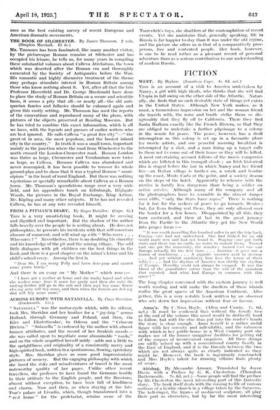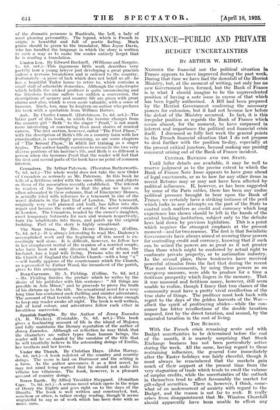FICTION
WEST. By Brylier. (Jonathan Cape. 4s. 6d. net.) Tins is an account of a visit to America undertaken by Nancy, a girl with high ideals, who thinks that she will find .
Utopia in full swing on the other side of the Atlantic. Naturally, she . finds that no such desirable state of things yet exists in the United States. Although New York makes: as it must, a tremendous impression on her and the woman friend • she travels with, the noise and bustle strike them so disagreeably that they fly off to California. There they find Santa Barbara exactly like the French Riviera, so that they are obliged to undertake a further pilgrimage to a colony: in the woods for peace. The peace, however, has a droll interruption as :this colony • is set up in a favourite place • for movie artists', and one peaceful morning breakfast is interrupted by a shot, and a man fixing up a target calls to them not to come out of their house or they will be killed.: A most entertaining account follows of the movie companies . which are billeted in this tranquil abode ; an Irish historical film is staged before the hut in which Nancy and her friend live—an Italian village is further on, a wreck and bonfire up the coast, Monte Carlo at the point, and a society drama on the steps of the hotel. Apparently to rehearse with the : movies is hardly less dangerous than being a soldier on: active service. Although many of the company and all• the photographers have to scramble in the utmost danger over cliffs, " only the Stars have ropes." There is nothing for it but for the seekers of peace to go towards Mexico ; • but, far from finding rest there, they arc only allowed over • the border for a few hours. Disappointed by all this, they , turn eastward, and then at last in the great journey from the Pacific to the Atlantic they get the New World into proper focus :— " it was worth travelling five hundred miles to get the trip back. Coming—one had not understood. One had looked for an old . world made new and had not found it. Staying—ono put forth roots and there was no earth, no water to sustain them. Turned east one got the immensity, the wonder • turned cast ono saw • Europe actually for the first time. . . .America—it gave one a horror of machinery. . . . A gigantic monster avid to destroy . . . And yet without machinery how face the terror of these wilds ? . . . And the rhythm of America was chiefly the rhythm ' of Europe. Heredity could not always be escaped. it was the blood of the grandfather rather than the will of the grandson . that counted. And what had Europe in common with this space ? "
The long chapter concerned with the eastern journey is well worth reading and will make the dwellers of these islands realise the great spaces of the American Continent. Altogether, this is a very notable book written by an observer who sets down her impressions without fear or favour.
Anna's. By C. Nina Boyle. (Allen and Unwin. 7s. 6d. net.)—It must be confessed that without the family tree at the end of the volume this novel would be distinctly bard to follow, but with the clue thus put into the reader's hands the story is clear enough. Anna herself is a rather awful figure with her serenity and inflexibility, and the calmness with which in her public-house in a West Country port she makes use of the former smugglers' facilities for getting rid of the corpses of inconvenient enquirers. All these doings are oddly mixed up with a conventional county family in the East of England, and it is the threads between the two • Nithich are not always quite as clearly indicated as they might be. However, the book is ingeniously constructed and Miss Boyle's talent for drawing villains finds plenty of scope.
. Abishag. By Alexandre Arnoux. Translated by Joyce. Davis, ivith a Preface by G. K. Chesterton. (Thornton Butterworth. 7s. 6d. net.)—Some people will find the preface by Mr. Chesterton the most interesting part of this fantastic story. The book itself deals with the coining to life of various sections of a Gothic church in a village taken by the Saracens. The bell-ringer, the figures of mediaeval sculpture, all play • their part as characters, but by far the most interesting of the dramatis personae is Rusticula, the bell, a lady of most pleasing personality. The legend, which is French in origin, is beautiful and full of poetic feeling. Much praise should be given to the translator, Miss Joyce Davis, who has handled the language in which the story is written in such a way as to make the reader entirely forget that he is reading a translation.
Linden Lea. By Edward Bucknell. (Williams and Norgate. '7s. 6d. net.)—This ingenuous little work describes very prettily how a young lawyer just developing a great practice suffers a nervous breakdown and is ordered to the country. Fortunately—a piece of luck which does not befall us all—he has a beautiful Tudor house to retire to, which contains a small staff of admirable domestics. Although the catastrophe which befalls the wicked profiteer is quite unconvincing and the frivolous heroine suffers too sudden a conversion, the descriptions of scenery and country life are given with great charm and also, which is even more valuable, with a sense of humour. Much, too, may be forgiven an author who prefaces his book with a quotation from William Barnes.
Ash. By Charles Connell. (Hutchinson. 7s. 6d. net.)—The latter part of this book, in which the heroine changes from the country girl " Beth " to the singer "Pearl," is not much more interesting or convincing than most stories of musical careers. The first section, however, called "The First Phase," with the description of Beth's life on a country farm with her grandmother, is exceedingly promising, as are some chapters of "The Second Phase," in which her training as a singer begins. The author hardly contrives to reconcile the two very diverse portions of his heroine's life, and Beth is so different a person when she becomes Pearl that the reader will feel that the first and second parts of the book have no point of common interest.
Crusaders. By Arthur Paterson. (Thornton Butterworth. '7s. 6d. net.)—The whole world does not take the new Order of Crusaders as seriously as Mr. Paterson. In this book he tells of a fictitious order with the same title, aims and objects as those of the association recently established. The interest to readers of the Spectator is that the plan we have so often advocated in these columns, that of Emergency Houses, is actually tried with reference to a tenement in one of the worst districts in the East End of London. The tenement, originally very well planned and built, has fallen into disrepair and become the centre of some of the worst criminals in London. The Crusaders, headed by the owner's daughter, erect temporary hutments for men and women respectively, turn the inhabitants into them, and patch up the original building. Part of the story is highly sensational.
The Next Move. By Mrs. Henry Dudeney. (Collins. 7s. Gd. net.)—ft is always interesting to read Mrs. Dudeney's accomplished work and the beginning of this novel is exceedingly well done. It is difficult, however, to follow her in her complacent recital of the reunion of a married couple, who have been not only divorced, but one of whom, the husband, has a legal wife living. Persons who do not call the Church of England the Catholic Church—with a long "a" —will hardly approve of the countenance which the Church, as represented by Father Wood, the incumbent of the parish, gives to this arrangement.
Deep Currents. By A. Fielding. (Collins. 7s. 6d. net.) —Mr. Fielding finishes the preface which he writes by the desire of his publisher with this sentence : "All things are possible in Asia Minor," and he proceeds to prove the truth of his dictum up to the hilt. No sensational novel for a very long time has contained such thrilling and sinister adventures. The account of that terrible society, the Bees, is alone enough to keep any reader awake all night. The book is well written, full of local colour, and adventures follow each other in breathless succession.
Spanish Sunlight. By the Author of Jenny Essenden (A. R. Weekes). (Constable. 7s. 6d. net.)—This book gives a fascinating account of life in the island of Majorca and fully maintains the literary reputation of the author of Jenny Essenden. Although on reflection he may think that the characters are rather types than human beings, the reader will be so dazzled by the sunshine of the title that he will trustfully believe in the astounding doings of Emilia, her brothers and her lovers.
Under the Thatch. By Christian Hays. (John Murray. 7s. 6d. net.)—A book redolent of the country and country doings. The scene is laid on Dartmoor and the setting is a farm. As the author announces it as a first novel, he may not mind being warned that he should not make his villains too villainous. The book, however, is a pleasant account of country doings.
Brave Earth. By Alfred 'rresidder Sheppard. (Jonathan Cape. 7s. 6d. net.)—A serious novel which opens in the reign of Henry the Eighth and goes right on to the days of the Stuarts. The book is well written and constructed, but, somehow or other, is rather stodgy reading, though'it seems ungrateful to say so of work which has been done with so much care.











































 Previous page
Previous page